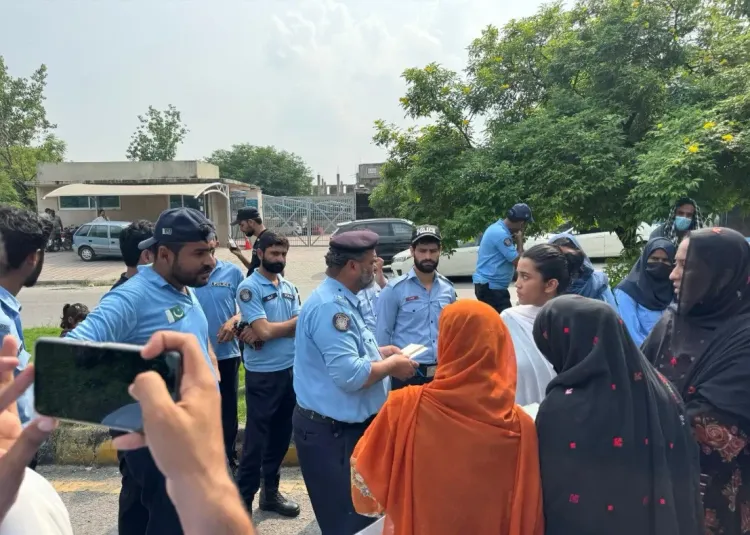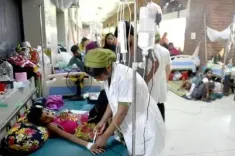Are Pakistan Authorities Silencing Baloch Protesters in Islamabad?

Synopsis
Key Takeaways
- Baloch Yakjehti Committee continues protests in Islamabad.
- Allegations of systematic intimidation by Pakistani authorities.
- Identity checks and surveillance of protesters reported.
- 84 cases of enforced disappearances documented in June.
- Urgent call for support from human rights advocates.
Islamabad, July 27 (NationPress) - As the sit-in in Islamabad enters its 12th day this Sunday, the Baloch Yakjehti Committee (BYC) has accused Pakistani officials of conducting systematic measures to intimidate and suppress the Baloch community. The police began identity card checks of protesters on Sunday, further heightening the atmosphere of harassment.
In a statement posted on X, BYC claimed that law enforcement and intelligence agents were photographing protesting women and their residences, which they described as a tactic to mark them for intimidation. They noted that access to the Islamabad Press Club is restricted and families have been barred from establishing protest camps, even in this extreme heat.
The ongoing demonstrations demand the release of BYC leaders and an end to enforced disappearances in Balochistan. The BYC is calling upon journalists, human rights advocates, and the general public to lend their voices in support of the Baloch cause.
“Day 12 - Islamabad Sit-In: Pakistani authorities persist in their systematic attempts to suppress and intimidate Baloch families. Today, Islamabad Police initiated identity checks of protest participants, further escalating harassment. This follows ongoing profiling, video surveillance, and threatening behavior towards those present. Last night, law enforcement and intelligence agents began tailing protesters, documenting the elderly and women returning to their temporary residences. They photographed them and the buildings they inhabit, clearly marking them for intimidation. These actions occur with the complete support of Islamabad Police. Within the protest area, law enforcement officials frequently enter, capturing video of students' faces to instill fear,” BYC stated on X.
“Currently, access to the Islamabad Press Club remains blocked, and families are still unable to set up a protest camp, neither during the heavy rains of the past days nor now in this intense heat. Daily, numerous elderly women and children suffer from heat exhaustion. These families have journeyed to Islamabad for a singular purpose: to demand the release of Baloch Yakjehti Committee (BYC) leaders and to halt enforced disappearances in Balochistan. We urge journalists, human rights advocates, democratic forces, and every conscientious citizen: Raise your voice. Stand with these families. Do not be complicit in this silence,” it added.
Additionally, the Baloch National Movement's Human Rights Department, Paank, reported on Sunday that Balochistan experienced 84 cases of enforced disappearances and 33 instances of extrajudicial killings in June.
In its latest report titled ‘Balochistan Human Rights Report – June 2025’, Paank documented numerous cases of enforced disappearances and extrajudicial killings. The data presented in the report is based on verified instances from June 2025, illustrating the deteriorating human rights landscape in Balochistan.
According to the report, various instances of enforced disappearances and unlawful detentions surfaced across 14 districts in Balochistan in June, including events in Karachi and Islamabad.
The districts of Kech and Mastung in Balochistan noted the highest disappearance rates. A total of 84 individuals were forcibly disappeared in June. Among them, many were held without legal processes, and 32 individuals were ultimately released, having endured both mental and physical torture during their detention.
In the report, Paank accused Pakistani forces of conducting extrajudicial killings without interruption. The report asserts that the Pakistani military is actively detaining and killing individuals without legal justification, often for unclear reasons. Paank reported 33 cases of extrajudicial killings in Balochistan in June, indicating, “These actions reflect a troubling trend of unchecked violence by state authorities.”







